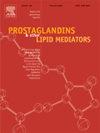玉米粉、非酯化亚油酸和地方性食道癌——初步研究结果
IF 2.5
3区 生物学
Q3 BIOCHEMISTRY & MOLECULAR BIOLOGY
引用次数: 0
摘要
地方性食道癌已显示出与玉米粉消费呈正相关。据推测,这种关联是由于玉米粉中亚油酸在胃粘膜中转化为前列腺素E2。因此,胃中可获得的未酯化亚油酸的比例可能是一个重要因素。用气液色谱法分析了商业制备的玉米粉、熟玉米粉和生玉米粉以及其他玉米基食品的总脂肪酸和游离脂肪酸含量。在玉米粉和用玉米粉制成的食品中发现了高水平的非酯化脂肪酸(占所含脂肪酸的11%至42%)。在玉米粉制成的食品中,每100克样品中发现49至363毫克未酯化亚油酸。饮食中高水平的非酯化亚油酸会导致胃内前列腺素E2分泌增加,并严重影响食管的正常pH值和液体含量,可能导致食管癌的发生。本文章由计算机程序翻译,如有差异,请以英文原文为准。
Maize meal, non-esterified linoleic acid, and endemic cancer of the esophagus—preliminary findings
Endemic cancer of the esophagus has shown a positive association with the consumption of maize meal. It has been postulated that this association is due to the conversion, in the stomach mucosa, of the linoleic acid contained in maize meal to prostaglandin E2. The proportion of non-esterified linoleic acid available in the stomach may therefore be an important factor. Samples of commercially prepared maize flour, cooked and uncooked, and other maize-based foods were analysed for total and free content of various fatty acids using gas-liquid chromatography. High levels of non-esterified fatty acids (11 to 42% of contained fatty acids) were found both in maize meal and in foods prepared from it. In food prepared from maize meal, 49 mg to 363 mg non-esterified linoleic acid per 100-g sample was found. High levels of non-esterified linoleic acid in the diet, causing raised intragastric production of prostaglandin E2 and profoundly affecting the normal pH and fluid content of the esophagus, may create a predisposition to esophageal carcinogenesis.
求助全文
通过发布文献求助,成功后即可免费获取论文全文。
去求助
来源期刊

Prostaglandins & other lipid mediators
生物-生化与分子生物学
CiteScore
5.80
自引率
3.40%
发文量
49
审稿时长
2 months
期刊介绍:
Prostaglandins & Other Lipid Mediators is the original and foremost journal dealing with prostaglandins and related lipid mediator substances. It includes basic and clinical studies related to the pharmacology, physiology, pathology and biochemistry of lipid mediators.
Prostaglandins & Other Lipid Mediators invites reports of original research, mini-reviews, reviews, and methods articles in the basic and clinical aspects of all areas of lipid mediator research: cell biology, developmental biology, genetics, molecular biology, chemistry, biochemistry, physiology, pharmacology, endocrinology, biology, the medical sciences, and epidemiology.
Prostaglandins & Other Lipid Mediators also accepts proposals for special issue topics. The Editors will make every effort to advise authors of the decision on the submitted manuscript within 3-4 weeks of receipt.
 求助内容:
求助内容: 应助结果提醒方式:
应助结果提醒方式:


